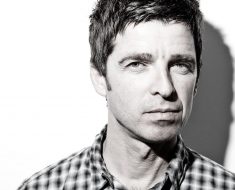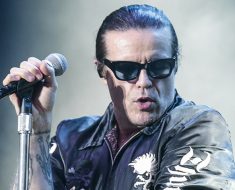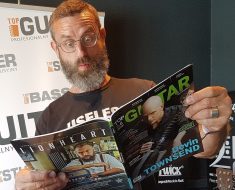
Steve Hackett net worth is $20 Million. Also know about Steve Hackett bio, salary, height, age weight, relationship and more …
Steve Hackett Wiki Biography
Stephen Richard Hackett was born on the 12th February 1950 in Pimlico, London, England, and is a singer, songwriter and guitarist, probably best recognized for being a former member of the British rock group Genesis. He is also known for being a solo artist.
So, have you ever wondered how rich Steve Hackett is, as of late 2017? According to authoritative sources, it has been estimated that the total size of Steve’s net worth is over $20 million, accumulated through his successful involvement in the music industry since 1970.
Steve Hackett was raised in his hometown, by parents Peter and June Hackett; his younger brother is John Hackett, a well-known musician. He went to Sloane Grammar School in Chelsea, meantime beginning to play the harmonica and recorder, and later, when he was 12 years old, he moved his focus on to the guitar. Some of his idols at that period were not only The Beatles and Jimi Hendrix, but also Mario Lanza and Johann Sebastian Bach.
Subsequently, Steve’s musical career began, as he started performing with such rock bands as Heel Pier, Canterbury Glass and Sarabande. In 1970, he became a member of Quiet World, along with his brother John, performing on their studio album “The Road”, which marked the beginning of his net worth. However, he decided to leave the band, and in the following year joined the rock band Genesis and performed on their album “Nursery Cryme” (1971), which was followed by the album “Foxtrot” (1972), peaking at No. 12 in the UK. The band’s next album “Selling England By The Pound” out came in 1973, and during the next year they also released “The Lamb Lies Down On Broadway”. Two years later, he was involved on their two albums “A Trick Of The Tail” and “Wind & Wuthering”, after which he decided to leave the band to pursue his career as a solo artist.
In 1975, Steve released his debut solo studio album entitled “Voyage Of The Acolyte”, which peaked at No. 26 in the UK and achieved silver certification. By the end of the decade, he had also released “Please Don’t Touch” (1978), “Spectral Mornings” (1979), and “Defector” (1980), all of which added a considerable amount to his net worth. During the next two decades, Steve continued successfully with his musical career, releasing such albums as “Till We Have Faces” (1984), “Guitar Noir” (1993) and “Darktown” (1999). Moreover, in 1986, Steve co-founded his own band called GTR, alongside guitarist Steve Howe, and they released during the same year the self-titled album, which was certified gold, and the song “When The Heart Rules The Mind” reached No. 3 on the US Rock chart.
In the new millennium, Steve didn’t have any major success until 2009, when out came his album “Out Of The Tunnel’s Mouth”, on which he collaborated with guitarist Anthony Phillips. To speak further about his career, he released “Beyond The Shrouded Horizon” in 2011, and “Wolflight” in 2015. Most recently, out came the album “The Night Siren” (2017), and his net worth is certainly still rising.
Besides the above, he also became known for releasing several classical albums, including “Bay Of Kings” (1983), reaching No. 70 in the UK, “Momentum” (1988), “Metamorpheus” (2005), and a blues album entitled “Blues With A Feeling” (1994), all of which contributed to his wealth.
Regarding to his personal life, Steve Hackett has been married to author Jo Lehmann since 2011. He was previously married to Kim Poor (1981-2007) and Ellen Busse (1972-1974), with whom he has a son.
IMDB Wikipedia $20 million 1950 1950-02-12 British England February 12 Genesis Gordian Knot GTR Guitarist Hackett Heel Pier Jo Lehmann Jo Lehmann (m. 2011) Johann Sebastian Bach John Hackett June Hackett Kim Poor Kim Poor (m. 1981–2007) Mario Lanza Musician Oliver Hackett Peter Hackett Pimlico Quiet World Record producer Rock Stars Sloane Grammar School Songwriter Stephen Hackett Stephen Richard Hacket Stephen Richard Hackett Steve Steve Hackett Steve Hackett Net Worth United Kingdom
Steve Hackett Quick Info
| Full Name | Steve Hackett |
| Net Worth | $20 Million |
| Date Of Birth | February 12, 1950 |
| Place Of Birth | Pimlico, United Kingdom |
| Profession | Musician, Record producer, Songwriter, Guitarist |
| Education | Sloane Grammar School |
| Nationality | British |
| Spouse | Jo Lehmann (m. 2011), Kim Poor (m. 1981–2007) |
| Children | Oliver Hackett |
| Parents | June Hackett, Peter Hackett |
| Siblings | John Hackett |
| Nicknames | Hackett, Steve , Stephen Hackett , Stephen Richard Hacket , Stephen Richard Hackett |
| https://www.facebook.com/stevehackettofficial | |
| https://twitter.com/hackettofficial | |
| MySpace | http://www.myspace.com/stevehackett |
| IMDB | http://www.imdb.com/name/nm1047925/ |
| Allmusic | https://www.allmusic.com/artist/steve-hackett-mn0000754587 |
| Music Groups | Genesis, GTR, Gordian Knot, Quiet World |
| Movies | Genesis: In Concert, Live at Wembley Stadium, Steve Hackett: The Tokyo Tapes: Live in Japan, Steve Hackett: Live Legends, Steve Hackett: Once Above a Time: Live in Europe 2004, Steve Hackett: Horizons, Guitar Legends |
Steve Hackett Quotes
- When it comes to reunions, let’s just say I’m not the one who says no.
- I wasn’t a part of that lineup of Genesis, so I don’t like to comment on it too much. The one thing I do find interesting is how they can keep a straight face when they say in interviews how “Invisible Touch” and “I Can’t Dance” are just as good as “Watcher of the Skies” and “Firth of Fifth”.
- Phil [Phil Collins] and I always had a special bond of sorts. We were the two “outsiders” in the band, the ones who didn’t go to school with the others. The day I decided to quit Genesis, we were in the middle of mixing our latest album. We were on a break and I saw Phil. He hailed a taxi to go back to the studio and asked me if I was joining him. I told him I was going to talk to him later. He gave me a puzzled look and took off. I knew if I got in that taxi, he’d be the one person to talk me out of leaving.
- I put a listing in Melody Marker, which was the big publication for putting bands together in England back in the 60s. I was looking for a band open to trying new things out, pushing the boundaries of what currently was considered rock music at the time. I got a phone call from Peter (Gabriel), who asked me if I had ever heard of Genesis before. I said no. He told me to listen to Trespass and then come listen to them rehearse. I did that and I liked what I heard, but realized I could add something to this band to take it to another level. We started jamming and improvising and immediately clicked. They invited me to join and I accepted. I was so excited at the time because I knew we were bringing something brand new to rock music and I liked being a part of it because I thought it was desperately needed at the time.
- Peter [Peter Gabriel] started like a regular frontman, but after one concert when he came out in a dress wearing a fox’s head, the crowd went wild. The costumes got more gaudy and the attention went more and more to him. The music almost became an afterthought. The four of us got a bit peeved that our contributions weren’t being acknowledged. Though we didn’t want him to leave the band, we saw it as a chance to bring the focus back to the music.
- I had no plans of leaving the band, but at the same time I was looking at other avenues to expand my creativity without growing stagnant or getting burned out. I thoroughly enjoyed the experience of doing a solo album, being in complete control of what was on it. After doing it, it was tough to go back to the band format. I increasingly yearned for more than what the format allowed and I knew that eventually the itch was going to be too much to ignore.
- Marillion has a really interesting new album at the moment [“Sounds That Can’t Be Made”], and the playing is very clever rhythmically, especially the first track [“Gaza”]. I think he’s [Ian Mosley] become a more economical player within the context of that band. But he’s done some seriously fast licks. There’s a track we did together on “Highly Strung” called “Always Somewhere Else.” The drums are in a fast 7/8 and every bit the equal to Phil Collins’ economy on that one.
- [on Ian Mosley] Ian is a phenomenal drummer; phenomenally fast.
- [about Genesis] There was nothing we wouldn’t touch, no prejudice against any style of music. When punk swept in, it was prejudice incarnate, ignorance hailed as virtue. It was fun for five minutes and The Sex Pistols were very entertaining, but, if you say “yah boo sucks” to everything, you’re throwing the baby out with the bathwater. Prog covers a multitude of areas, everything from jazz to classical to comedy. We were happy to embrace big band sounds, opera, pantomime. And, all these years later, that’s still going down a storm with audiences.
- When I was with Genesis, I’ll never forget being on tour in America in 1973 when we were trying to make it there and hearing John Lennon say on WNEW New York radio that he “loved” our album “Selling England By The Pound”. Even if I never ever sell another album in my life–I will always remember that. It doesn’t get much better than that–a tribute from Lennon, that the great man himself listened to our records. It gave us a heck of a buzz and real encouragement.
- It’s Chopin (Frédéric Chopin) I think of when the piano is used at its best – underplayed, gentle and melancholic.
- [on “The Fountain Suite” from his album “Tribute”, dedicated to Andrés Segovia] What can be said about ‘Andrés Segovia that hasn’t been said already? Let’s just say on the nylon guitar his playing informs my every note! I wrote this as a tribute to his eternal influence.
- As a young kid growing up in the 1950s I found that one of the first things I liked listening to on the radio was the sound of Mario Lanza; little did I understand then that this was the sound of opera and of the musical influence it would have on me.
- I remember watching a television performance of one of [Johann Sebastian Bach’s] pieces back in the [1960s]. The piece being played moved slowly and leisurely through its chord changes which I remember were being played in such a gentle and sublime manner. It was at that early stage in my musical development that I realized there was a lot more to chords than one expected and that the minutia, the detail in music is incredibly important.
- I still have a deep passionate love of chords and their progressions, and I find that the likes of Bach (Johann Sebastian Bach) and Mario Lanza remain influential in my thoughts when working on compositions.
- I tend to play a lot on nylon guitar these days as well as electric guitar, but I think my current choice of favourite guitar sound would be one comprising a repeat echo, with reverb and distortion on the feedback. This I feel makes the sound a little more reminiscent of a violin and is a sound I enjoy listening to and working with. The guitar can be played in a manner that emulates many different instruments of course and is one of the reasons I enjoy playing it so much.
- I would say if you are serious about composing structurally and creating interesting sounds with instruments, perhaps one should listen in detail to certain classical music. The minutia of a piece is critically important, especially in classical composition and so taking steps to understand the detail in a piece will help significantly.
- [about Genesis in the years after he left the band] In the positive sense, they were more streamlined and you could say they were very smart in jettisoning what was known as the prog style, in favor of something much shorter and more media-friendly. I do think they threw the baby out with the bathwater, though. They did a 360-degree turnaround and managed to lose a fanbase. This is where Pink Floyd have scored. They can reform whenever they want–with or without the full complement of players. You either like those slow, ponderous, introverted, atmospheric songs or you don’t. They’re not a band in support of a frontman.
- [on why he left Genesis] I was getting tired of bringing ideas into the group which I felt they weren’t going to do. I felt that the band was heading towards an area that was becoming very safe.
- I have always believed that one half of me was born to be an acoustic guitar player, the other half to play rock guitar and to do both with equal passion.
- I know that Genesis inspired a lot of young musicians because people still write to me and say that was the reason why they got into playing. I just count myself fortunate that I’ve been part of the soundtrack to someone’s youth.
Steve Hackett Important Facts
- He is a good friend of long-time Marillion drummer Ian Mosley. Mosley was actually initially recruited to Marillion after the band’s original lead singer, Fish, had seen him play for Hackett.
- Founder/owner of Wolfwork Records (UK) and Camino Records (UK).
- Inducted into the Rock and Roll Hall of Fame as a member of Genesis in 2010.
- Although he left Genesis due to his dissatisfaction with how much of his own music was being accepted by the band, his favorite Genesis album is actually “Wind & Wuthering”, which was also his final album with the band.
- Formed GTR with Steve Howe in 1986. The idea was to create a band with two lead guitarists and use synth effects instead of keyboards. They had two hits with “When The Heart Rules The Mind” and “The Hunter” (written by Geoff Downes, who also produced the band).
- Worked with Chris Squire in autumn 2007, providing guitar for the “Chris Squire’s Swiss Choir” Christmas album.
- His favorite songs are “All Along the Watchtower” by Jimi Hendrix Experience, “I Want You” by Bob Dylan, “Kashmir” by Led Zeppelin, “All Your Love” by John Mayall, “The Nazz are Blue” by Paul Samwell-Smith, “I Wanna Be Your Man” by The Rolling Stones and “My Generation” by The Who. (Source: November 2006 Classic Rock Magazine).
- In 1999 he reunited with his former Genesis band-mates Phil Collins, Peter Gabriel, Tony Banks and Mike Rutherford for a re-recording of the Genesis song “The Carpet Crawlers” (originally from their 1974 album “The Lamb Lies Down on Broadway”), which appears on the Genesis compilation “Turn it on Again”.
- Wife Kim Poor is an artist and has painted the album covers for all of his post-Genesis albums.
- Lead guitarist of the rock group Genesis from 1971 to 1977.
Steve Hackett Filmography
| Title | Year | Status | Character | Role |
|---|---|---|---|---|
| Second Chance | 1981 | TV Series 6 episodes | Composer | |
| The Genesis Concert Movie | 1977 | Documentary | Composer | |
| Danny Baker Rocks… (A Bit) | 2014 | TV Mini-Series writer – 1 episode | Soundtrack | |
| Metal Evolution | 2012 | TV Series documentary writer – 1 episode | Soundtrack | |
| Genesis: When in Rome | 2008 | Video writer: “In The Cage Medley [In The Cage, The Cinema Show, Duke’s Travels]”, “Firth of Fifth”, “I Know What I Like In Your Wardrobe”, “Los Endos”, “The Carpet Crawlers” | Soundtrack | |
| Wild Flowers | 1997 | writer: “Carpet Crawlers” | Soundtrack | |
| Genesis: The Way We Walk – Live in Concert | 1993 | Video documentary writer: “Old Medley” | Soundtrack | |
| Genesis: Live at Wembley Stadium | 1988 | Video writer: “Los Endos” | Soundtrack | |
| Genesis: The Mama Tour | 1984 | Video documentary writer: “Turn It On Again” | Soundtrack | |
| Rock ‘N’ Roll Island | 2015 | Documentary short completed | Self | |
| Mario Lanza: The Best of Everything | 2017 | Himself | Self | |
| 5 News | 2016 | TV Series | Himself | Self |
| Play It Loud: The Story of Marshall | 2014 | TV Movie documentary | Himself – Genesis 1970-1977 | Self |
| Genesis: Together and Apart | 2014 | TV Movie documentary | Himself | Self |
| Breakfast | 2012 | TV Series | Himself | Self |
| Metal Evolution | 2012 | TV Series documentary | Himself | Self |
| Glasnost Rock – Rock Summer 88 | 2011 | TV Movie documentary | Himself | Self |
| Genesis: The Video Show | 2004 | Video | Himself | Self |
| Timeshift | 2004 | TV Series documentary | Himself – Genesis | Self |
| This Is Your Life | 2003 | TV Series documentary | Himself | Self |
| The Genesis Songbook | 2001 | Video | Himself | Self |
| Behind the Music | 1999 | TV Series documentary | Himself | Self |
| Cue the Music | 1991 | TV Series | Himself (1993) | Self |
| New American Bandstand 1965 | 1986 | TV Series | Himself (as GTR) | Self |
| GasTank | 1982 | TV Series | Himself – Guest | Self |
| The Genesis Concert Movie | 1977 | Documentary | Himself | Self |





